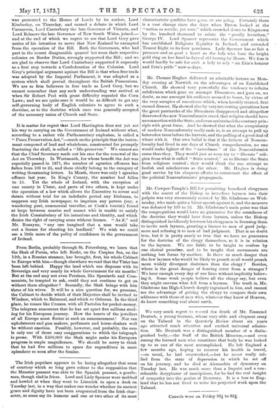Mr. Cowper-Temple's Bill for permitting beneficed clergymen with the assent
of the Bishop to introduce laymen into their pulpits was very strenuously resisted by Mr. Gladstone on Wed- nesday, who made quite a bitter speeeh against it, and the measure was defeated by 199 to 53. Mr. Gladstone's main point was that the congregations would have no guarantee for the soundness of the doctrine they would hear from laymen, unless the Bishop distinguished invidiously between his clergymen in licensing them to invite such laymen, granting a licence to men of good judg- ment and refusing it to men of bad judgment. That is no doubt true, but it is pretty nearly as true that we have no guarantee for the doctrine of the clergy themselves, as it is in relation to the laymen. We are liable to he taught to confess by one clerical preacher, and to be taught that sacraments are nothing but forms by another. Is there so much danger that the few laymen who would be likely to preach at all would preach more widely divergent doctrines than the clergy ? Besides, where is the great danger of hearing error from a stranger ? We hear enough every day of our lives without implicitly believ- ing it. Some weak people believe all the clergy say, but even they might canvass what fell from a layman. The truth is, Mr. Gladstone has High-Church deeply ingrained in him, and cannot see the advantage of getting the clergy to compare their own addresses with those of men who, whatever they know of Heaven, do know something real about earth.


































 Previous page
Previous page